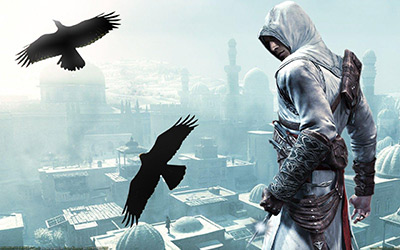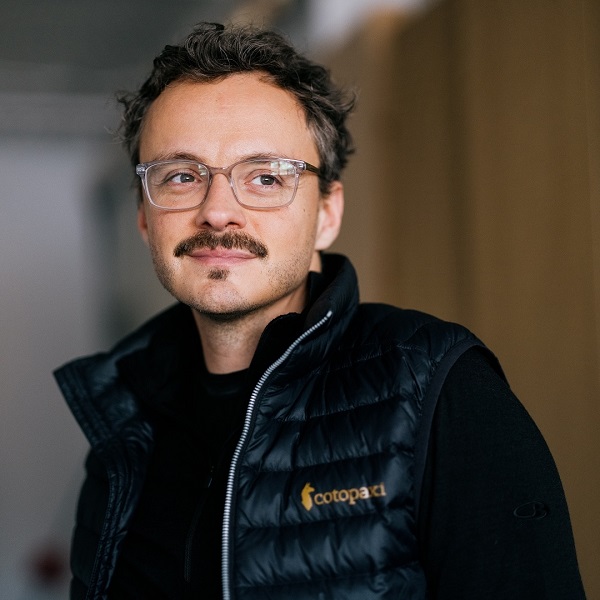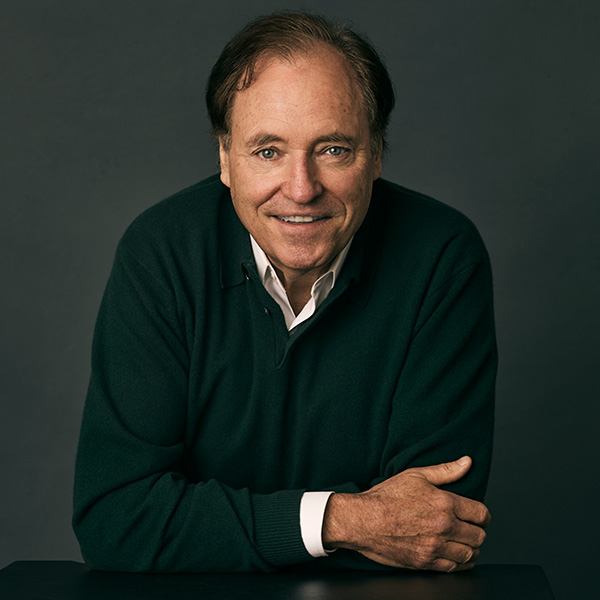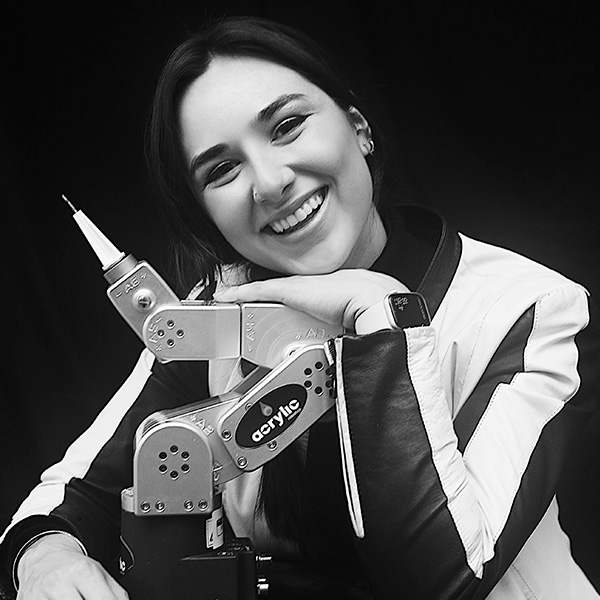Jade Raymond, BSc’98, has gone far since graduating from McGill, although in a literal sense, her illustrious career in gaming has only taken her a few blocks from campus.

The co-creator of the wildly successful Assassin’s Creed franchise – it has sold over 140 million copies since the release of the first game in 2007 – is currently at Google, in charge of their brand new gaming division, in the role of vice-president and head of Stadia Games and Entertainment. It just so happens Google’s Montreal office is located on McGill College and St. Catherine, just a stone’s throw from her alma mater.
“I often walk through the campus on my way to work – especially mornings when I don’t have an early meeting,” Raymond says during a recent interview at Google’s Montreal office. “One morning, a torrential downpour started as I was walking through campus, so I ducked into the [convocation] tent. For a second I felt like a student again.”
A Montreal native, Raymond had a different experience at school compared to those who come from elsewhere. With friends and family already close, Raymond concentrated on her studies.
“I felt a little removed from university life,” she recalls. “When I was there, I was more focused on the classes and being in the computer lab. What was really cool was in addition to doing computer science, I also did art history classes. It was an interesting juxtaposition, where in the computer science classes I was one of three or four women in the class, and then in art history it was the inverse.”
Both pursuits would end up proving invaluable when Raymond, while at Ubisoft Montreal, was tasked with a few others (including another McGill alumnus: Claude Langlais, BEng’99) with developing a new franchise from the ground up.
Building a blockbuster
The studio created Assassin’s Creed, an adventure game set in different time periods that established an ancient rivalry between two secret societies, the Assassins and the Knights Templar. The careful attention paid to historical detail was one factor that made the franchise unique right from the start. It became a worldwide phenomenon, one that’s still going strong after 11 installments and even more spinoffs.
Raymond played a key role in the franchise’s first few releases, serving as executive producer for Assassin’s Creed II and Assassin’s Creed: Bloodlines. She says the series was originally conceived so future teams could put their own twist on the game – new characters, settings and time periods can be explored in each new version. In her estimation, it’s a major reason why the Assassin’s Creed series has been such an enduring hit.
“Prior to Assassin’s Creed, I had always worked on franchises that had already existed (like The Sims), and what I noticed was often we were asked to make sequels to games that never intended to have sequels,” Raymond says. “How many opportunities do you have to create a completely new brand from scratch? I thought, if this ends up being successful, I really want to make it so that it lives on and continues to be interesting, not just for the people who play it, but the people who work on it too.”
She played a key role on other major titles for Ubisoft, including Tom Clancy’s Splinter Cell: Blacklist and Watch Dogs. In 2018, when Raymond was named to the Variety 500, a listing of the most influential figures in the world of entertainment (others on the list included Jeff Bezos, Tom Cruise, Ellen DeGeneres and Kendrick Lamar), Variety described her as “a gaming powerhouse.”
Raymond grew up in a household where playing video games was less frowned upon than watching TV. At school, her two favourite subjects were art and science. In her teens, she realized there might be an industry where she could combine those interests.
“It actually dawned on me while playing video games that someone gets to make these games as a career,” Raymond told The Montreal Gazette in 2015.
Raymond’s passion for games was evident during her McGill years. One formational project occurred in a computer science class taught by Gerald Ratzer. Although it was about micro-computer architectures and systems, for Raymond’s software development project, she developed a video game.
“This project was followed by a standup presentation in class, in front of their peers,” recalls Ratzer, a former professor of computer science at McGill, now retired. “She certainly had good communication skills, which are needed in management to motivate your team.”
Ratzer adds that this software development project was what many students used as a portfolio after graduation.
Raymond remembers her first foray into game development with a laugh.
“It was terrible! I made a really bad adventure game, but I think that’s commonly the first thing people who want to make games end up doing. It was a classic point-and-click puzzle adventure game,” Raymond says.
It didn’t take long for Raymond to find work after graduation – within three days she was hired as a programmer. After stops at Sony Online in New York and as technical producer on The Sims Online, Raymond’s role evolved from producer on the technical side to being producer of game content.
Following Assassin’s Creed, Raymond founded Ubisoft’s Toronto studio and served as managing director. She returned to Montreal to start Motive Studios for Electronic Arts, and as of March 2019 has been heading Google’s Stadia Games and Entertainment.
New start at Stadia
In addition to working with external developers and indie developers to help them publish their games on Stadia, Google’s new cloud-based gaming service, Raymond is also heading Google’s internal development teams, which includes the first Stadia studio, based in Montreal.
How is she able to work with so many studios from around the world all at once? It’s thanks to the cloud – meaning every element of a game’s creation is available anywhere as long as you have internet access.
“One of the biggest challenges in game development is you want all these people from around the world to collaborate. But with games there are so many assets – like art and music – that packing it up and figuring out how to get it to someone else is really complicated. With Stadia you just send a link and people can work on it directly,” Raymond says.
The same goes for gamers, who can sign in and play Stadia from anywhere. Stadia promises choice: some people like playing a game on their phone while waiting for the bus, while others prefer playing at home in high definition on a big screen.
The cloud is just one of many ways the game industry has changed over the years.
“For the most part, developing games has become a bigger and bigger production,” Raymond says. “The game industry has gone from being worth 2.6 billion dollars to one game, Fortnite, making that on its own. As it has grown, the blockbusters have grown. I think it’s commonly known Assassin’s Creed has about 1,000 people working on a single game across 10 studios. Managing a product that’s over 100 million dollars in budget over 10 studios versus a project back in the day with 20 to 30 people, it’s a very different thing.”
Whether it’s a team of 20 or a team of 200, Raymond has seen it all as an industry leader. As the public face for the projects she has led, she is unfailingly poised. She is more than just a skilled communicator, though. She also has the technical know-how to thoroughly appreciate the difficult grunt work that goes into creating a game. “I always just wanted to be a programmer.”
In 2019, when the New York Videogame Critics Circle presented Raymond with its Andrew Yoon Legend Award, the organization praised Raymond for being “on the vanguard of making the subject matter of games more thought provoking and relevant to our world.” The group added that “her contributions as an industry leader have been equally noteworthy: Jade has been a clear voice and important example in making the game business more inclusive.”
“Jade is a very important role model in the game industry,” says Harold Goldberg, the president of the New York Videogame Critics Circle, and a writer who covers video games for The Washington Post and other publications. “After Jade accepted the Andrew Yoon Legend Award … portions of her speech were tweeted by young women and went viral.”
With more women than ever getting into gaming, Raymond says she is happy to answer their questions when they land in her inbox.
“That’s one of the most inspiring things to me these days, that more women are excited about games,” Raymond says. “It’s been humbling to run into women who tell me they got into games because they played Assassin’s Creed. The thing is, if you don’t play games growing up, you’re probably not going to think about doing it as a career. Now that more women are playing games, there are more women thinking about careers in gaming.”
Raymond also helped bring Montreal’s gaming scene to prominence, and it has continued to thrive since Assassin’s Creed put Ubisoft Montreal on the map. The industry generates thousands of jobs in the city, and Raymond doesn’t see any signs of it slowing down, either.
“Montreal’s gaming scene has continued to grow,” Raymond says. “More and more game studios are here. I was building Motive here for Electronic Arts. There’s a Warner Brothers studio, there’s an Eidos studio, there’s a Bethesda studio, now Google is building a studio. There’s been nothing but growth since Assassin’s Creed.”
At least part of the credit for that goes to a woman who often takes a stroll through the McGill campus on her way to work in the morning.
Erik Leijon is a Montreal-based journalist who writes about music, gaming and other subjects. His work regularly appears in The Montreal Gazette and Cult MTL.


